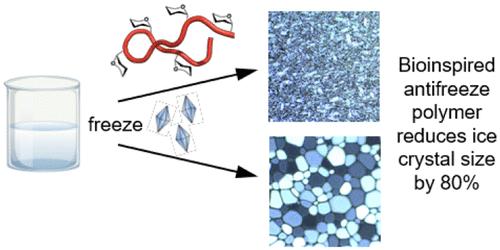当前位置:
X-MOL 学术
›
Biomacromolecules
›
论文详情
Our official English website, www.x-mol.net, welcomes your
feedback! (Note: you will need to create a separate account there.)
Glycosylated Polyhydroxyproline Is a Potent Antifreeze Molecule
Biomacromolecules ( IF 5.5 ) Pub Date : 2024-05-22 , DOI: 10.1021/acs.biomac.3c01462 Thomas J McPartlon 1 , Charles T Osborne 2 , Jessica R Kramer 1, 2
Biomacromolecules ( IF 5.5 ) Pub Date : 2024-05-22 , DOI: 10.1021/acs.biomac.3c01462 Thomas J McPartlon 1 , Charles T Osborne 2 , Jessica R Kramer 1, 2
Affiliation

|
Molecules that inhibit the growth of ice crystals are highly desirable for applications in building materials, foods, and agriculture. Antifreezes are particularly essential in biomedicine for tissue banking, yet molecules currently in use have known toxic effects. Antifreeze glycoproteins have evolved naturally in polar fish species living in subzero climates, but practical issues with collection and purification have limited their commercial use. Here, we present a synthetic strategy using polymerization of amino acid N-carboxyanhydrides to produce polypeptide mimics of these potent natural antifreeze proteins. We investigated a set of mimics with varied structural properties and identified a glycopolypeptide with potent ice recrystallization inhibition properties. We optimized for molecular weight, characterized their conformations, and verified their cytocompatibility in a human cell line. Overall, we present a material that will have broad applications as a biocompatible antifreeze.
中文翻译:

糖基化聚羟脯氨酸是一种有效的抗冻分子
抑制冰晶生长的分子对于建筑材料、食品和农业的应用来说是非常理想的。防冻剂对于组织库的生物医学尤其重要,但目前使用的分子具有已知的毒性作用。抗冻糖蛋白在生活在零度以下气候的极地鱼类中自然进化,但收集和纯化的实际问题限制了它们的商业用途。在这里,我们提出了一种利用氨基酸N-羧酸酐聚合来生产这些有效的天然抗冻蛋白的多肽模拟物的合成策略。我们研究了一组具有不同结构特性的模拟物,并鉴定了一种具有有效的冰重结晶抑制特性的糖多肽。我们优化了分子量,表征了它们的构象,并验证了它们在人类细胞系中的细胞相容性。总的来说,我们提出了一种作为生物相容性防冻剂具有广泛应用的材料。
更新日期:2024-05-22
中文翻译:

糖基化聚羟脯氨酸是一种有效的抗冻分子
抑制冰晶生长的分子对于建筑材料、食品和农业的应用来说是非常理想的。防冻剂对于组织库的生物医学尤其重要,但目前使用的分子具有已知的毒性作用。抗冻糖蛋白在生活在零度以下气候的极地鱼类中自然进化,但收集和纯化的实际问题限制了它们的商业用途。在这里,我们提出了一种利用氨基酸N-羧酸酐聚合来生产这些有效的天然抗冻蛋白的多肽模拟物的合成策略。我们研究了一组具有不同结构特性的模拟物,并鉴定了一种具有有效的冰重结晶抑制特性的糖多肽。我们优化了分子量,表征了它们的构象,并验证了它们在人类细胞系中的细胞相容性。总的来说,我们提出了一种作为生物相容性防冻剂具有广泛应用的材料。













































 京公网安备 11010802027423号
京公网安备 11010802027423号